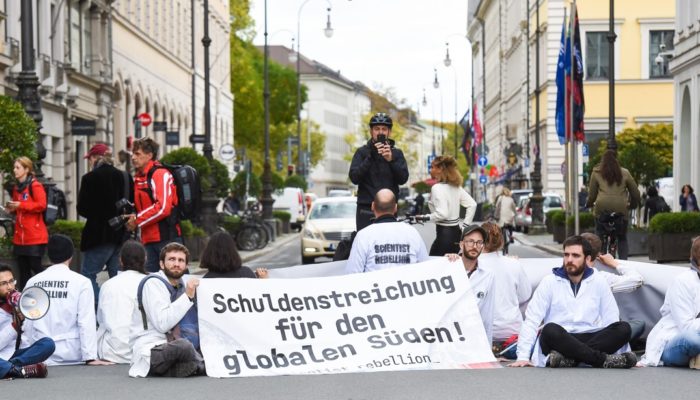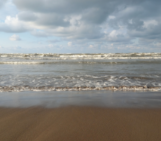
On the night preceding Halloween, somewhere in the main police station of Munich, 15 people appeared one by one before a judge of the local court who notified them their deprivation of liberty, deemed as “indispensable in order to prevent the imminent commission/continuation of a criminal/orderly offence of considerable importance for the general public”. For most of them this preventive custody would last 6 days, from the police headquarter’s prison to the Stadelheim penitentiary facility, spent in individual cells.
All were part of Scientist Rebellion (SR), a recent international environmentalist group mostly made of academics, engineers, students and other scientists who engage in non-violent civil disobedience to expose the reality and severity of the climate and ecological emergency.
SR was initiated in 2020 by two postdoc researchers in Scotland, gradually engaging in actions in Europe, the US, Africa and beyond, notably during the COP26 in Glasgow and in a global campaign in April 2022. Last October many SR members converged in Berlin and then Munich for a campaign of disruptive actions ahead of COP27, in parallel with actions in several countries worldwide, demanding political powers to admit their failure to initiate transformative changes that could maintain global warming below 1.5°C (as in the Paris Agreement), to initiate debt cancellation for countries of the global South, and the rapid decarbonisation of the transport sector. The associated actions included disrupting the reception of the WHO summit, occupying accesses of the German ministry of finance and of transport, occupation of a Porsche showroom, occupation in front of BlackRock offices, a roadblock in central Munich, and occupation of the BMW Welt showroom.
I was among them. A few months ago I engaged in civil disobedience, as a citizen and as a scientist. I knew that the non-violent actions I joined in Munich, while essentially symbolic, could very well lead me to prison. And it did.

A statement on my engagement in the Scientist Rebellion campaign, released when I was in detention. Find all the statements here (scrolling up the thread).
While the SR members were being held captive, there were several gatherings in European cities, sometimes in front of German embassies, and in France opinion column titled “In the face of the climate crisis, “let’s not blame the wrong people”: scientists defend colleagues arrested in Germany” demanding our immediate release was signed by more than 1000 French academics (including lead IPCC contributors) in 24 hours.
Earlier this year, a comment in Nature Climate Change was contending that “we have long since arrived at the point at which civil disobedience by scientists has become justified”. How did we get here?
Words in a changing world
Not many hydrologists can deny using expressions such as “water resources”, “environmental change”, “global warming”, “water management”, “risk”, “disturbance”, “droughts”, “floods”, “pollution”, etc. in the introduction, sometimes discussions and conclusions of our publications, project proposals, posters, conference talks and other communications to provide context, to explain why our research is needed and why its implications are crucial for societies and ecosystems. We use these words because it’s accurate: in many cases, we document ongoing changes with substantial implication for society.
We live in these changes. And we know they extend far beyond the water cycle, because our line of work as academics make us efficient at creating or synthesizing current knowledge regarding our planet’s trajectory. We are facing an increasingly bleak future, and the causes have been identified: an unsustainable use of resources, which also stockpiles greenhouse gases in the atmosphere (and in the oceans).

Poster pasting in front of the Ministry of Finances in Berlin Oct 17th, 2022. Photo: Scientist Rebellion
However, it is obvious that the political translation of the fact-based evidence and recommendations given by scientists is very weak. This is one manifestation of what the historian of science Naomi Oreskes calls the trouble with the supply-side model of science: “our overall situation suggests that it does not suffice for scientists simply to supply factual information, and leave it at that”.
What can we do then?
The illusion of scientific neutrality
Facing all these dissonances has put some colleagues in great emotional difficulty. I also see more and more researchers saying that we can no longer stay in our laboratories. That we must speak out. But quickly enough, someone will object on the grounds of scientific “neutrality”.
Scientists are citizens. Whatever science we do cannot remain completely value-free, independent from social influences; this is an ideal not feasible nor desirable according to the current literature in sociology and philosophy, and therefore unfit to evaluate research practices and public discourses of academics. This is why, instead of neutrality, a working group on public engagement at the University of Lausanne “puts forward the notions of objectivity, scientific rigour and transparency about values” in a recent report I really encourage you to read.
As long as these ethics are followed, many ways of communicating with peers, stakeholders and the public sphere may be considered; from appeased recommendations to stakeholders all the way to (illegal) civil disobedience, as those may only differ by their degree of engagement in reporting facts. To which should be added the ethics of responsibility: we must say what we know.
We are all activists
Finally, the “transparency of values” commands that we should behave as scientists according to the values we chose to endorse. We can reasonably assume that most of us aspire to a safe future in a society minimizing exploitation, prejudice and suffering. These values are being put every day further from reach by, among other things, the anthropogenic climate change and ecological destruction. Doing nothing on the pretext of keeping a “value-neutral” attitude, effectively results in acting for the preservation of this unsustainable status quo.
This is why I consider civil disobedience to be part of my freedom of speech in doing my job as a hydrologist and as a scientist at large; a way to “engage creatively with the existential challenges we are confronting”, as G. Delmestri puts it in a great blog post. One of these challenges is not to let people who are incompetent, who don’t know what they are saying, or who have conflicting interests take over the public debate, especially when our own survival and civilization are at stake.
Edited by Maria-Helena Ramos

